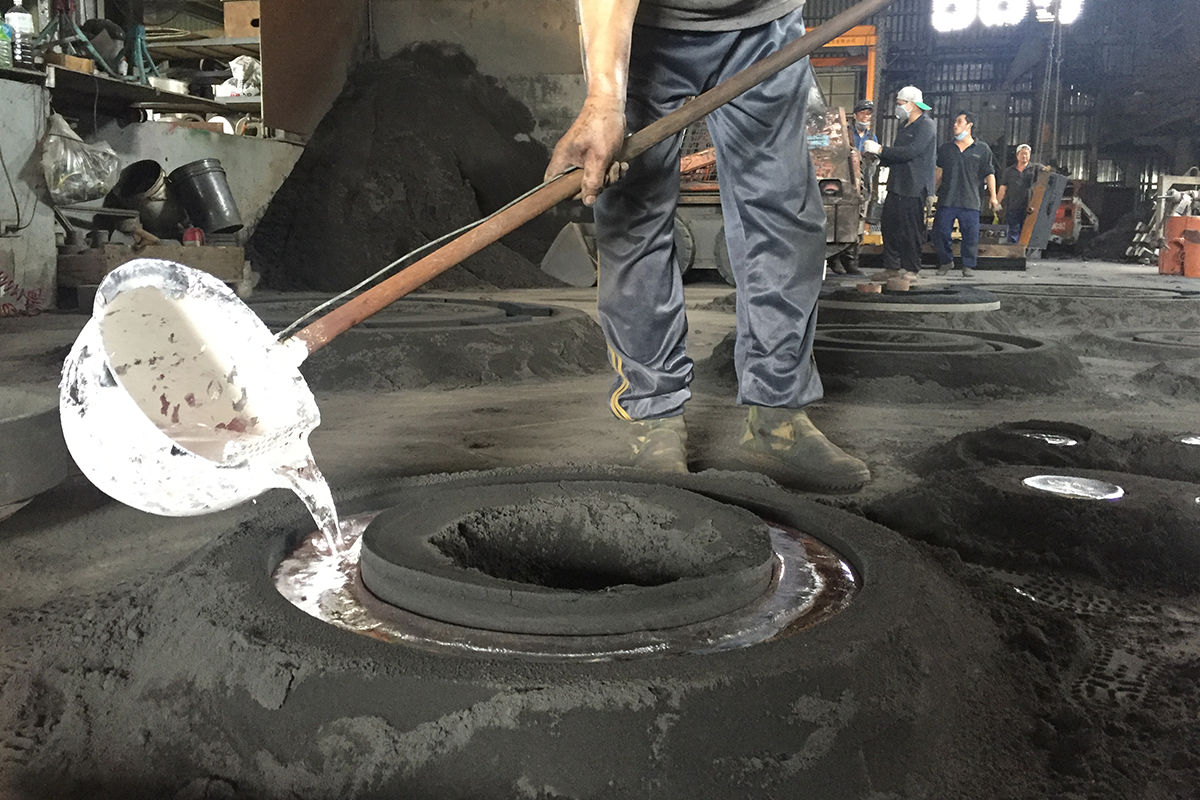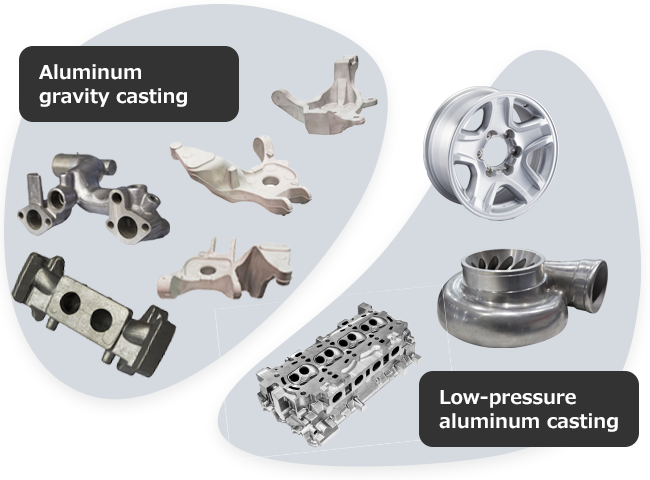Highlighting Aluminum Foundry Wisconsin for manufacturing casting needs
Understanding the Perks and Innovations in the Aluminum Foundry Market
The Aluminum Foundry market plays an essential role in contemporary manufacturing. Its lightweight buildings especially boost gas performance, specifically in aerospace and automotive industries. On top of that, Aluminum's resistance to deterioration warranties longevity in different applications. As the industry progresses, innovations such as innovative recycling and additive production are reshaping manufacturing techniques. Exploring these advancements discloses not only the advantages however also the obstacles in advance for Aluminum foundries in a swiftly altering market.
The Lightweight Benefit of Aluminum
Aluminum's lightweight nature offers substantial advantages throughout different sectors, especially in manufacturing and transportation. Its reduced density permits the manufacturing of elements that are easier to handle and mount, resulting in lowered labor expenses and boosted effectiveness. In the auto industry, lighter lorries add to boosted fuel economic situation and lower exhausts, aligning with global sustainability objectives. In aerospace, the use of Aluminum lowers the overall weight of aircraft, which is essential for improving efficiency and lowering operational prices.
Additionally, Aluminum's lightweight homes promote innovative designs that were previously unfeasible with much heavier materials. This versatility allows suppliers to develop intricate forms and frameworks while keeping architectural honesty. Overall, the lightweight advantage of Aluminum not only enhances product performance yet additionally drives developments in innovation and layout, making it a recommended product in numerous applications.
Corrosion Resistance and Longevity
The Aluminum Foundry industry is renowned for producing materials with superior deterioration resistance, making them ideal for numerous applications. This home, combined with enhanced architectural stability, contributes to the long-lasting efficiency benefits that Aluminum parts use. Therefore, industries significantly rely upon Aluminum to fulfill requiring environmental conditions without compromising quality.
Superior Deterioration Resistance
While numerous metals deal with significant difficulties from environmental aspects, Aluminum sticks out for its premium corrosion resistance, making it a recommended choice in lots of applications. This property is mainly due to a natural oxide layer that bases on the Aluminum surface, offering an obstacle versus wetness and harsh representatives. Unlike other steels that might rust or break down in time, Aluminum keeps its stability also in extreme settings, such as seaside locations or commercial settings. Additionally, its light-weight nature combined with rust resistance makes it optimal for applications in aerospace, automobile, and marine industries. Overall, Aluminum's outstanding sturdiness not just enhances item long life but also reduces upkeep expenses, providing an engaging advantage for customers and suppliers alike.
Enhanced Structural Stability
Designers and designers increasingly acknowledge the relevance of improved architectural integrity in modern applications, where both deterioration resistance and toughness are vital. Aluminum alloys, understood for their light-weight residential properties, also show extraordinary resistance to rust, making them ideal for extreme atmospheres. The cutting-edge strategies utilized in the Aluminum Foundry sector contribute considerably to generating parts with improved durability. Advanced casting procedures and alloy make-ups are customized to fulfill certain efficiency demands, guaranteeing that structures can endure severe conditions without compromising stability. Surface therapies and finishings enhance the life-span of Aluminum products, additionally mitigating wear and tear over time. This concentrate on improved architectural stability not only expands the functionality of materials however additionally decreases maintenance prices, strengthening Aluminum's position as a product of choice in different industries.
Durable Performance Perks
Long-lasting performance in Aluminum elements is greatly credited to their superior rust resistance and resilience. Unlike lots of steels, Aluminum normally forms a protective oxide layer, which protects against rust and degeneration in numerous environments, including aquatic and commercial settings. This fundamental residential or commercial property significantly expands the life-span of Aluminum products, minimizing maintenance and replacement expenses. In enhancement, the light-weight nature of Aluminum boosts its applicability throughout industries without compromising strength. The material's resistance to use and tear likewise contributes to its dependability popular applications, making it an ideal choice for automotive, aerospace, and construction industries. As industries increasingly prioritize sustainability and longevity, Aluminum's efficiency advantages line up with contemporary engineering needs, strengthening its duty in cutting-edge manufacturing procedures.
Ecological Effect and Sustainability
 As the Aluminum Foundry industry advances, it progressively focuses on ecological impact and sustainability, acknowledging the need for accountable techniques in the face of climate modification. Initiatives to decrease waste and energy usage go to the forefront, with lots of shops adopting reusing campaigns to redeem Aluminum scrap. This not only minimizes basic material usage however additionally notably cuts down power expense, as recycled Aluminum needs just a portion of the energy compared to key production.
As the Aluminum Foundry industry advances, it progressively focuses on ecological impact and sustainability, acknowledging the need for accountable techniques in the face of climate modification. Initiatives to decrease waste and energy usage go to the forefront, with lots of shops adopting reusing campaigns to redeem Aluminum scrap. This not only minimizes basic material usage however additionally notably cuts down power expense, as recycled Aluminum needs just a portion of the energy compared to key production.Additionally, innovations in exhausts control innovations are being carried out to lower air contaminants, lining up procedures with stricter environmental guidelines. Foundries are view it now likewise exploring different power resources, such as solar and wind, to power their facilities sustainably. By cultivating collaboration with stakeholders, the market aims to establish ingenious remedies that boost ecological stewardship. Collectively, these campaigns highlight a dedication to lowering the Aluminum Foundry's carbon impact while advertising a round economic situation within the manufacturing sector.
Advanced Production Techniques
 Transforming production procedures, the Aluminum Foundry industry is increasingly incorporating innovative manufacturing methods to improve efficiency and accuracy. Methods such as computer system mathematical control (CNC) machining and additive production have become important elements in enhancing production process. CNC machining enables high-precision element construction, greatly decreasing material waste and production time. Meanwhile, additive production opens up brand-new opportunities for complicated geometries and lightweight designs that were formerly hard to achieve.
Transforming production procedures, the Aluminum Foundry industry is increasingly incorporating innovative manufacturing methods to improve efficiency and accuracy. Methods such as computer system mathematical control (CNC) machining and additive production have become important elements in enhancing production process. CNC machining enables high-precision element construction, greatly decreasing material waste and production time. Meanwhile, additive production opens up brand-new opportunities for complicated geometries and lightweight designs that were formerly hard to achieve.Furthermore, the implementation of automation and robotics in Aluminum shops enhances procedures, reduces human error, and boosts worker safety. These technologies promote an even more responsive manufacturing atmosphere, allowing producers to adjust swiftly to market demands. The assimilation of sophisticated simulation software application even more boosts the style and screening stages, resulting in premium product top quality. Collectively, these strategies not only boost functional efficiency however also foster technology, positioning the Aluminum Foundry sector at the forefront of contemporary manufacturing.
Technologies in Recycling Procedures
The Aluminum Foundry industry is not just progressing in making techniques yet is also making considerable strides in reusing processes. Advancements are arising to boost the performance of reusing approaches, lowering power intake and boosting sustainability. Advanced arranging modern technologies, such as automated optical sorting, enable the recognition and splitting up of Aluminum from various other materials with high precision. This results in a better of recycled Aluminum, which is essential for maintaining the honesty of the end products.
Furthermore, closed-loop recycling systems are being executed, allowing manufacturers to recycle Aluminum scrap within their very own production procedures. This reduces waste and advertises a round economic situation. Additionally, research study into brand-new recycling methods, such as hydrometallurgical processes, provides the possibility for recuperating Aluminum from complex waste streams. These innovations not just contribute to lowering the carbon footprint of the Aluminum Foundry industry however additionally boost its economic practicality in an increasingly eco mindful market.
Applications Across Different Industries
Numerous sectors are increasingly identifying the flexibility and benefits of Aluminum Foundry items, resulting in prevalent applications across fields such as automobile, aerospace, construction, and consumer items. In the automobile market, Aluminum spreadings add to lightweight automobile layouts, improving gas performance and efficiency. Aerospace manufacturers use Aluminum elements for their strength-to-weight proportion, vital for airplane frameworks and parts.
In construction, Aluminum is favored for its toughness and resistance to deterioration, making it ideal for window frameworks, roof covering, and architectural assistances. Customer items additionally take advantage of Aluminum Foundry products, as seen in kitchenware, electronics, and product packaging, where light-weight and recyclable materials are important.
The adaptability of Aluminum Foundry methods permits for elaborate designs and exact requirements, providing to the varied requirements of these markets. As a result, Aluminum Foundry products are becoming integral to modern production procedures across various sectors.
Future Trends in Aluminum Foundries
As sectors proceed to develop, Aluminum foundries are poised to welcome a number of essential patterns that promise to enhance performance and sustainability. One famous pattern is the increasing fostering of digital technologies, consisting of automation and expert system, which streamline procedures and enhance quality assurance. Furthermore, the push in the direction of sustainable practices is leading shops to purchase reusing innovations, substantially lowering waste and power intake.
 One more emerging pattern is making use of sophisticated alloys and products, satisfying the expanding demand wikipedia reference for lightweight and long lasting parts throughout numerous fields (Aluminum Foundry). In addition, the assimilation of additive production methods is expected to reinvent part design, providing customization and reducing lead times
One more emerging pattern is making use of sophisticated alloys and products, satisfying the expanding demand wikipedia reference for lightweight and long lasting parts throughout numerous fields (Aluminum Foundry). In addition, the assimilation of additive production methods is expected to reinvent part design, providing customization and reducing lead timesCollaboration with study establishments is likewise expected to drive innovation, as shops seek to develop brand-new processes and products. Aluminum Foundry. Jointly, these patterns show a transformative future for the Aluminum Foundry market, aligning with more comprehensive objectives of Extra resources sustainability and efficiency
Often Asked Concerns
What Are the Typical Prices Connected With Aluminum Foundry Manufacturing?
The common prices connected with Aluminum Foundry manufacturing consist of basic materials, labor, power, devices upkeep, and overhead expenses. These factors jointly influence the total economic investment needed for effective Aluminum casting operations.
Just How Does Aluminum Contrast to Various Other Metals in Stamina?
Aluminum, while lighter than many steels, shows remarkable strength-to-weight ratios. Contrasted to steel, Aluminum is much less strong however offers exceptional corrosion resistance, making it a positive selection in applications where weight and sturdiness are important.
What Precaution Remain In Area in Aluminum Foundries?
Safety procedures in Aluminum shops generally include required personal protective devices, air flow systems to regulate fumes, normal equipment maintenance, training programs for workers, and adherence to rigorous safety and security regulations to reduce dangers related to liquified steel handling.
Just How Is Quality Assurance Managed in Aluminum Casting Processes?
Quality control in Aluminum casting processes includes extensive examinations at numerous stages, including raw material assessment, procedure monitoring, and end product screening. Strategies such as statistical process control and non-destructive testing warranty adherence to market standards.
What Certifications Are Crucial for Aluminum Foundry Providers?
The value of accreditations for Aluminum Foundry vendors includes ISO 9001 for quality management, ISO 14001 for ecological monitoring, and industry-specific requirements like ASTM and SAE, making sure compliance, safety, and integrity in making processes.
The Aluminum Foundry industry plays a vital role in modern production. The Aluminum Foundry industry is renowned for producing products with exceptional corrosion resistance, making them ideal for numerous applications. Reinventing production procedures, the Aluminum Foundry industry is significantly integrating advanced production strategies to boost effectiveness and accuracy. The Aluminum Foundry market is not just advancing in making methods but is additionally making significant strides in reusing processes. As markets continue to progress, Aluminum foundries are positioned to embrace a number of key patterns that assure to enhance performance and sustainability.